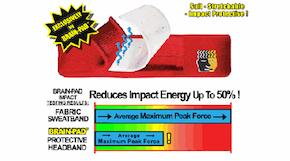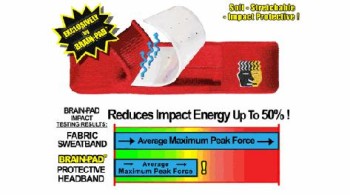Parents of young athletes should be warned that some sports equipment manufacturers are trying to capitalize on concussion fears with claims that their gear can prevent head injuries, the director of the Center for Brain, Biology and Behavior at the University of Nebraska-Lincoln said during a recent interview.
Despite what some manufacturers claim, “there is no reviewed, known literature that says mouthguards or headbands prevent against concussions,” said Dr. Dennis Molfese, director of the brain center and scientific director of the Big 10/CIC-Ivy League Traumatic Brain Injury Research Collaboration.
The Federal Trade Commission has been cracking down on false claims made in mouthguard ads for the past few years. The FTC reached a settlement in August 2012 with Brain-Pad Inc., and its president, Joseph Manzo, prohibiting the company from claiming that its mouthguards can reduce risk of concussions. At the time, Brain-Pad’s website stated that they could.
Brain-Pad’s website now makes no such claim.
That November, the FTC sent warning letters to 18 sports equipment manufacturers whose product lines included mouthguards, ordering them to reword their product descriptions, according to Betsy Lordan of the Office of Public Affairs.
But now, Molfese said, companies are claiming that a “rubber band” that goes around the heads of soccer players prevents concussions. “There is no data for this claim,” he said.
Brain-Pad touts the impact-absorbing qualities of its protective headband on its website.
Brain-Pad, for instance, says on its website that its headband “reduces impact energy up to 50 percent” without demonstrating where the information was gathered. While the website doesn’t use the word “concussion,” the phrasing used can be misleading, Molfese said.
“We’re all concerned about fraud,” Molfese said. “Parents say, ‘My kid has a headband, why can’t they go back to play?’ And that’s because there is no fully preventative measure.”
When asked if Brain-Pad’s wording could be construed as deceptively advertising concussion prevention, Lordan declined to comment, stating the FTC doesn’t speak about individual companies unless announcing a complaint or order violation.
Manzo, meanwhile, was clear in delineating that his products don’t make any concussion claims. “Brain-Pad claims that its products are proven to reduce impact forces to the base of the skull; we say nothing about concussions. No one knows anything about concussions,” he said in a recent interview.
When asked if he thought the phrasing used on his site could be confusing to consumers that the headband reduces concussions, Manzo replied, “I don’t know. … I just know they’ll think it reduces impact forces.”
Molfese recently collaborated on a paper published by the National Academy of Sciences entitled, “Sports-Related Concussions in Youth: Improving the Science, Changing the Culture,” which discusses false marketing and deceptive language being used to take advantage of growing concussion awareness. Molfese says companies are using the growing notoriety of concussions to make a profit on their products that don’t actually help.
“We get 10 to 15 calls a week from parents asking about mouthguards and headbands and how they can help with their kid’s concussion,” says Molfese. “And that’s the danger.”
By Antonio Barbera
Capital News Service




Write a Letter to the Editor on this Article
We encourage readers to offer their point of view on this article by submitting the following form. Editing is sometimes necessary and is done at the discretion of the editorial staff.